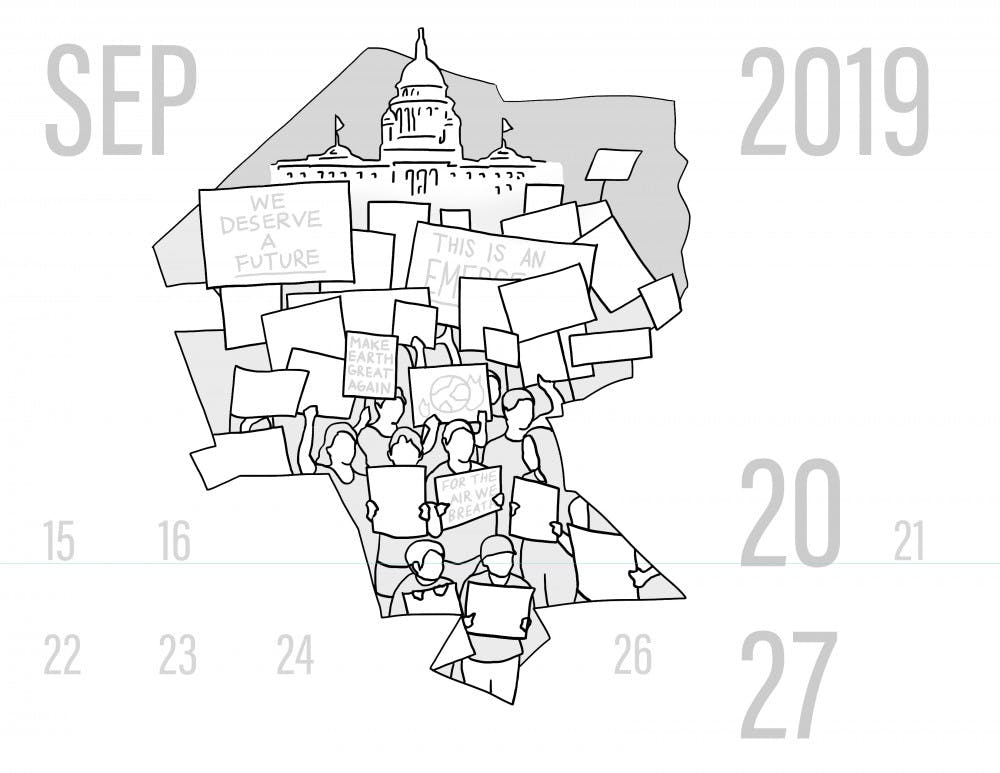Since over 1000 people participated in Providence’s climate strike two weeks ago, local organizers said they have seen more students mobilize for climate justice. But some organizers expressed fear that students on campus might be too complacent and insulated to organize consistently for the future.
Turnout at the Sept. 20 climate strike exceeded the expectations of several organizers from Sunrise Providence and Zero Hour, two local climate activism groups. According to Joshua Kestin, a coordinator of Sunrise Providence, the chapter collected about 800 new names from participants who signed in at the strike. Sunrise is now reaching out to all of these new participants, and has seen new people show up to meetings and offer to take on leadership roles.
“One of the most promising parts about the strike was how it mobilized a lot of people who hadn’t previously been engaged with Sunrise,” he said, adding that he has already seen “an astonishing amount of enthusiasm” from new participants to help plan the next climate strike, which is scheduled to take place in November.
Max Mines ’20 is one of these new climate justice activists. Mines felt inspired to act after a friend confronted him about his lack of involvement. He even became a vegetarian and convinced his roommates to quit eating red meat. After attending the Sept. 20 strike, Mines said he feels “more invested, and it becomes a more real issue and an issue that I feel less scared to engage with.”
“There have been people who, post strike, have been really excited about getting involved, and are really excited about this incredible coalition of youth groups globally and in the U.S. who are putting their resources and power behind this escalation of mass noncooperation,” added Nina Wolff Landau ’20, a co-coordinater of Sunrise Brown.
The climate strike’s messaging has especially resonated with local high school students.
According to Zanagee Artis ’22, cofounder and deputy director of advocacy for Zero Hour, Providence high school students’ engagement with the climate justice movement has greatly increased since the strike.
“Doing protests is something that’s very exciting to young people,” Artis said. Although he was disappointed with the number of University students who were unwilling to skip class to attend the strike, Artis noted that protests like the one on Sept. 20 are “pushing forward this idea that climate justice and climate action needs to be more mainstream.”
Mines echoed the excitement of attending a strike and the power of protests to make political change. “I don’t think there’s any point in time when you feel more motivated than when you’re at a strike surrounded by people chanting and (who are) all there for this cause,” he said.
But getting people out of their classrooms and workplaces and into the streets might be the hardest part.
Mines said he doesn’t think he could drop all of his other interests to focus on fighting for climate justice like some of his friends have. “It’s easy with the amount of work we have and maybe the somewhat insulated culture to not get involved,” Mines said. Especially for University students, it’s difficult to balance schoolwork and remain “a political citizen,” he added.
To Seth Goldstein ’22, a newly active member of Sunrise Brown, students prioritizing school over climate justice demonstrates a disconnect between theoretical and actual participation in activism on campus.
Many University students intellectually understand the gravity of climate change but are not buying into the message that “we have to actually change our life … and not go to class or take time out of our normal routine because it’s an emergency,” Goldstein said.
Estrella Rodriguez ’22, a co-coordinator of Sunrise Brown, agreed with this characterization but added that she believes “this campus has a lot of potential.” The climate strike increased Sunrise’s visibility, she added, but greater awareness does not necessarily translate to more students showing up at strikes.
“Maybe the messaging and the urgency of the climate crisis just isn’t resonating deeply enough with the student body, which is so privileged and probably doesn’t have to face the impacts of climate change directly,” Rodriguez said. “We’re just going to have to make sure that the urgency of the crisis really does reach people, even with all the layers of privilege that people have.”
To Kestin, perhaps the most concerning obstacle to climate justice is “the failure of comfortable liberals to engage in the kind of serious political activism that we know is going to be necessary to decarbonize our entire economy.”





